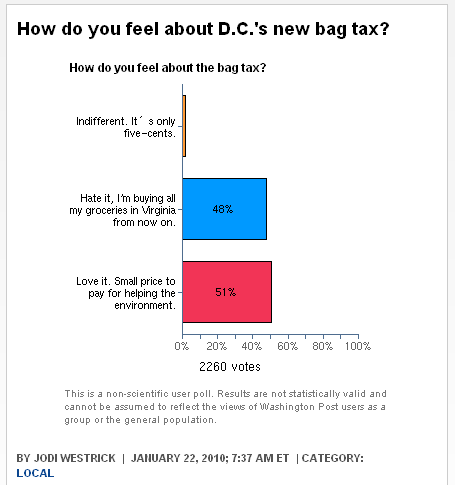In honor of St. Patrick's Day, (Lucky) Charm City declined to move forward with a proposed 25 cent bag tax.
What they appear poised to do instead, however, is a remarkably reasonable sounding alternative. Rather than outright banning bags, they would require any affected business that wants to hand out plastic bags to participate in a "plastic bag reduction" program.
The terms of this program are as follows:
- Stores must not give out bags unless the customer asks for them.
- Stores must collect bags for recycling.
- Stores must offer reusable bags for sale, and post signs encouraging their use.
The new policy would also require stores to report on the number of disposable bags they hand out, as well as the number of reusable bags they sell. This information will be used to evaluate the effectiveness of the program.
Nobody in the US is likely to pass a 25 cent bag tax. Typical denizens of Seattle
Typical denizens of SeattleIf there's one thing we can all agree upon, it's that Seattle, Washington is a bastion of patchouli-wearing, clove-smoking, bio-fuel-using hippies. And yet even so, these guys
soundly defeated a 25 cent bag tax in a referendum last year. If Seattle isn't willing to tax plastic bags like they were unfiltered Lucky Strike cigarettes, then really, who is.
I have to believe that anyone who proposes such an onerous tax on something that has about the same environmental impact per person per year as driving your car for a half-hour, really doesn't think it's going to pass. Well, maybe in Seattle, the tofu-eaters really thought they could pass it. But not anywhere else.
The reality is probably slightly more sinister: whoever wrote this legislation in Baltimore knew full well it would never pass the laugh test. But in doing so, they were able to appear to be progressive among the compost-heapers, while being able to quietly reassure the business community that it would never pass.
And sinister though this may be, it's also smart. Because it paves the way for a much more reasonable approach to the issue.
Sin taxes in DCDC has among the lowest taxes in the United States on gas, beer, and liquor. Yet we choose to raise revenue though a regressive tax on consumer purchases.
Beer: $0.09/gallon.
Tied with one state for lowest in the nation.Liquor: $1.50/gallon.
Only Vermont is lower.Cigarettes: $2.50/pack - slightly above the median.
Gasoline: $0.20/gallon.
Only 11 states are lower.Oil, when used to make a plastic bag:
$10.00/gallon (approx. 200 bags/gallon)
Anyone who reads this blog knows I oppose DC's bag tax, primarily because I think that it's using a big stick to swat a tiny gnat. I don't think bags are a major contributor to the trash problem, and I
know they represent a tiny fraction of the oil/greenhouse gas problem. So I think that implementing a brand-new tax that's regressive, inconvenient, and is likely to have inconsequential benefits, is a really bad idea. Apart from the minimal benefits it will likely create, it wastes valuable political capital that could have been saved up for something that would be really effective, like a bottle bill.
But I'm an environmentalist and I am 100% behind efforts to change people's habits -- but
without legislating that change where it's not absolutely necessary to solve a big problem. In this case, the problem is not big, and the tax is not necessary to effect change.
There's something about human psychology that makes people resist doing things that are good for them, even if they're easy, when you tell them it's going to be illegal to do that. But if you encourage people, and help them understand the benefits without shoving it down their throats, they will, in time, usually adopt that change. It's a simple as catching more flies with honey than with vinegar.
An example of this kind of policy is the U.S. EPA and U.S. DOE's
ENERGY STAR program -- which I actually work on in my career. ENERGY STAR is a labeling program that identifies the most efficient products in its class. The basic premise is to change consumer attitudes with education. Let them know that they'll save money, educate them about energy use in consumer products and appliances, and make it easy to distinguish between energy-hogs and energy-sippers. The program, which has been around for nearly two decades now, has been remarkably successful. And the industry changes and reacts to consumer preferences. For example, the market share of front-loading clothes washers, which use much less water and electricity than conventional top-loading clothes washers, is over 35% in the U.S. today, compared to essentially zero fifteen years ago.
And all that without a law that told you what you had to buy.
Kudos to Baltimore for rejecting the "big stick" approach to the bag issue. I hope this passes and am very interested to see the results.








